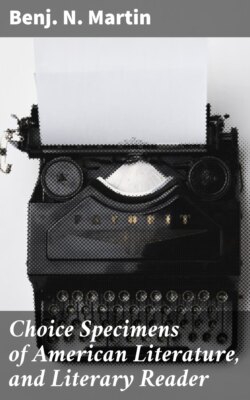Читать книгу Choice Specimens of American Literature, and Literary Reader - Benj. N. Martin - Страница 83
На сайте Литреса книга снята с продажи.
=53.= SCIENCE MAGNIFIES GOD.
ОглавлениеWe contend at present only for the position that we cannot have a science of nature which does not regard the spirit of man as a part of nature. But is this all? Do man and nature exhaust the possibilities of being? We cannot answer this question here. But we find suggestions from the spectrum and the spectroscope which may be worth our heeding. The materials with which we have to do in their most brilliant scientific theories seem at first to overwhelm us with their vastness and complexity. The hulks are so enormous, the forces are so mighty, the laws are so wide-sweeping, and at times so pitiless, the distances are so over-mastering, even the uses and beauties are so bewildering, that we bow in mute and almost abject submission to the incomprehensible all; of which we hesitate to affirm aught, except what has been manifest to our observant senses and connected by our inseparable associations. We forget what our overmastering thought has done in subjecting this universe to its interpretations. Its vast distances have been annihilated, for we have connected the distant with the near by the one pervading force which Newton divined. We have analyzed the flame that burns in our lamp, and the flame that burns in the sun, by the same instrument—connecting by a common affinity, at the same instant and under the same eye, two agents, the farthest removed in place and the most subtle in essence. As we have overcome distances, so we have conquered time, reading the story of antecedent cycles with a confidence equal to that with which we forecast the future ages. The philosopher who penetrates the distant portions of the universe by the omnipresence of his scientific generalizations, who reads the secret of the sun by the glance of his penetrating eye, has little occasion to deny that all its forces may be mastered by a single all-knowing and omnipresent Spirit, and that its secrets can be read by one all-seeing eye. The scientist who evolves the past in his confident thought, under a few grand titles of generalized forces and relations, and who develops and almost gives law to the future by his faith in the persistence of force, has little reason to question the existence of an intellect capable of deeper insight and larger foresight than his own, which can grasp all the past and the future by an all-comprehending intelligence, and can control its wants by a personal energy that is softened to personal tenderness and love.
[Footnote 19: A Congregational divine, born in Connecticut, long
Professor of Metaphysics in Yale College, and writer of many critical
Essays and Reviews. His treatise on "The Human Intellect," is the most
elaborate American work upon Psychology.]
* * * * *
=William Henry Milburn,[20] 1823-=
From "Lectures."
